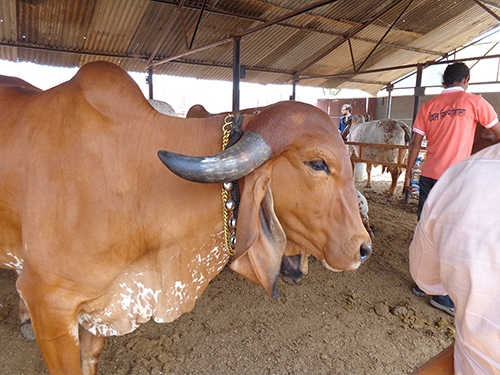Cookies
Van Hall Larenstein treats its customers' information with the utmost care and will never make this information available to third parties. Read more about us Privacy and Cookie Policy
Researchers from VHL University of Applied Sciences (VHL) and GEA Milking & Dairy Farming visit India between April 2 and April 9 to collaborate with Indian family-dairy farmers, entrepreneurs and researchers to develop innovative concepts for the Indian dairy sector. In the project, ten Dutch companies and eight Indian farmers collaborate with VHL and Saxion Universities of Applied Sciences and the Agricultural College of Agricultural Development Trust, Baramati, India.
The goal of the project is to adapt Dutch technology and knowledge to the circumstances of Indian family farmers. During the trip the project members will have a full program with Indian stakeholders and experts.
VHL, University of Applied Sciences is working since 2011 with the college and the information Centre KVK of Agricultural Development Trust Baramati in Pune district. With this project KVK will help family farmers to scale up from 10-40 cows to 80-100 cows, with a higher production and quality. V
an Hall Larenstein and Saxion Universities of Applied Sciences and several Dutch companies want, to develop in this innovative project: integrated solutions for the expanding dairy farms in the state of Maharashtra, Pune district in India. In the same time, the project will create new opportunities for exporting knowledge and technology for the participating Dutch companies. Both Dutch and Indian students and researchers of the participating universities are involved in the project. The project is funded by the Dutch organization for Applied research, SIA-RAAK.
Today there will be a briefing on the state of the art and a discussion about the planning of the coming week. Later on, the team will work on the demonstration Dairy farm of KVK. Tuesday will start with an expert meeting on Value Chains. There will be presentations and workshops on Untouched Milk Chains and short Producer-to-Consumer Chains. Later on that day there will be a second expert meeting on innovative Barn Design. New materials for barn design will be tested on the participating farms.
The next day the team will have a third expert meeting on Fodder and the problem of Saline/Salt in fodder. There will be discussions about the feed availability, silage making and animal feeding recipes and practices. On this Wednesday researchers and students, will test new materials for barn roofing on several participating farms. And evaluate the findings with the Indian farmers and experts.
In the afternoon be on-farm meetings on Farming Systems and Business Modelling. Also farms there will be on-farm workshops on fodder and record keeping. On Thursday there will be a meeting about data collection. The focus of this meeting will be: what is needed to set up a good data collection system and how this can be implemented, possibly with the help of smart-apps.
The final day the team will evaluate the week and discuss the opportunities for follow up projects. Agricultural Development Trust is planning the development of an Agro-Science park where Dutch, Indian and other companies will collaborate with Indian and International knowledge institutes. The results of the week will contribute to the final advisory reports and designs that will be ready in august.
